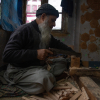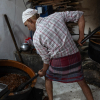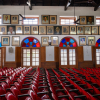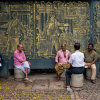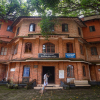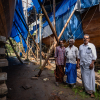I mark my passage
With words that smell life
— That’s All, K. Satchidanandan
K. Satchidanandan is arguably the finest poet writing in Malayalam. At 74, having published over 50 volumes of poetry, including translations from many Asian and European languages, he is both a peer and mentor to aspiring as well as established poets in Malayalam. He is also the most translated Malayalam poet in Indian and European languages—multiple collections of his work have been published in English, Italian, Chinese, Arabic, Spanish, German, French, Hindi, Tamil, Kannada, Bengali and Marathi, among other languages. His poetry has been celebrated across languages and cultures, as is evident in the scores of awards and honours he has received. He has also been invited to read at prestigious festivals across the world and deliver lectures at numerous academic institutions. His essays in literary and cultural criticism in Malayalam and English have been collected in over 20 volumes. Throw in the plays, travelogues, newspaper columns, editorials, and the numerous edited works, Satchidanandan is a library in himself.
However, Satchidanandan is much more than his published works. For many years, he taught graduate students in a small town in Kerala and edited numerous journals. This pedagogic streak in his professional life has, in fact, seeped into the core of his personality. For thousands of admirers he provides a moral compass in a fast-paced and deeply polarising world. He is definitely a teacher but more in the Socratic tradition committed to dialogue, debate, discussions and constant renewal. From social media to lit fest sessions and interview slots to letters to editor columns, Satchidanandan is always in conversation with friends and foes alike, sharing sorrows laughs, writing out and signing petitions, speaking out for justice and arguing reason. Reading him, listening to him, makes one stay in tune with the times.
Satchidanandan was born on May 28, 1946, in Pulloott, a village in Thrissur district, Kerala, in a Hindu Nair family. His father, KC Shankara Menon, was a small farmer, and mother, K Kunjukkutti Amma, a homemaker. He studied in local schools and graduated in Zoology from Christ College, Irinjalakkuda. He did his postgraduation in English from the Maharaja’s College in Ernakulam in 1967. The Maharaja’s College then had a galaxy of well-known writers as faculty, and Ernakulam provided an urban experience to Satchidanandan, who, until then, had lived in the rural and semi-urban parts of Thrissur district. At college, Satchidanandan read widely, in Malayalam and English—poetry and fiction, classical and modern literature, history and philosophy. It is there that Satchidanandan started getting noticed as a promising poet and essayist among serious Malayalam readers. In 1969, he married Thulasi Devi (Bindu), and the next year, he joined the English faculty of Christ College. The same year, his first book, Kurukshetram, a study of modern Malayalam poetry, was published.
The modernist poetry in Malayalam by Ayyappa Paniker, N.N. Kakkad, Kadammanitta Ramakrishnan, Madhavan Ayyappath, M.N. Palloor, Attoor Ravi Varma, M. Govindan, Vishnu Narayanan Namboothiri, etc. had caught the angst of the 1950s and 1960s. These writers transformed the language and diction of Malayalam poetry by risking the ire and criticism of the literary establishment of the time. The individual was at the centre of this revolt in literature and all calls to subsume individuality in a collective self was viewed with deep suspicion by these writers.
The 1960s were also a period of transition. The age of Nehru had ended and the communist movement was in great turmoil. The peasant revolt in Naxalbari, the Vietnam War, the famine-like situation in the country, provided the conditions for a radical political and cultural upheaval in the 1970s. The cultural expressions of the 1970s, riding on a new wave of Red thought, of course, did not disavow the modernist tradition, but preferred to explore a new pact between the individual and the collective. These were stridently political and was unambiguous in messaging. The Bangladesh war and refugee influx, the Naxalite violence, the shock of the Emergency and curtailment of civil liberties turned the world upside down and found a resonance in the poetry, fiction and cinema of the 1970s. It is in the midst of a great turmoil that a young Satchidanandan discovered his voice.
Arguably his first standout poem, Ezhuthachhanezhuthumbol (When Ezhuthachhan Writes) was published in 1971. In this poem, we find a voice tracing his legacy to the sixteenth-century master poet who laid the foundations of modern Malayalam and exploring the relationship between the word and world. It is a work of self-discovery and a sort of statement by the poet that in the act of creation the creator and the object of creation become indistinguishable.
In Fever, a 1973 poem that captures the feverish spirit of the decade, Satchidanandan writes:
Why is it our poetry is not
black like the bursting pupils of our eyes?
Why doesn’t it sing lion-songs
in the depths of the woods like the wild Niagra?
Why doesn’t it flow fierce like the floods
of Amazon, its face swollen
and eyes red with nights of vigil?’
— asked he, sipping the sugarless tea.
I didn’t need to answer, had only to
turn my eyes to the moth-eaten map,
hanging limp on the wall,
to the dense desolation of that small peninsula.
‘Do you still love this land?’:
Words fell lightly, like dew on leaves.
‘ . . . but not this India, not this
valley of skeletons’.
The poems of this decade (Satyavangmoolam, Bodhavati, Naavumaram etc.) were powerful utterances that captured the spirit of that time in a language and idiom that was feverish in tone, invoking fierce imagery and drama. There was also the odd poem, Mazhayude Nanartham (The Many Meanings of Rain), a shower of images new to Malayalam poetry. It also revealed a poet who could charm words to turn into images unseen before in the language.
The political promise of the Seventees died quickly and disillusionment set in. The violence unleashed against, and by, the Naxalites turned many artists who had associated with the movement against it. In the case of Satchidanandan, it made him revisit the theory and praxis of revolutionary politics. The angry collective ‘We’ in his poetry made way for a more reflective ‘I’. Poems like Ivide Njan Otteyakunnu (Here I am Alone) mark this rupture with the old paradigm. The new politics that emerged from the radicalism of the Seventees, among them environmentalism, gender, caste, found a reflection in his poems of the 1980s. A gentler and deeply empathetic and reflective voice emerged, which always spoke up for the marginalised, for justice. The Buddha emerges as a moral figure in these works—Satchidanandan’s Buddha’s poems makes themselves a fascinating excursion into the various dimensions of Siddhartha Gautama’s political religion. The pursuit of justice, an underlying theme even in his early days, becomes the elemental theme of Satchidanandan’s poetry. The Buddha and Gandhi are transformed into discursive subjectivities to explore the ethics of justice and morality of politics.
This strand of inquiry has since become a defining feature of Satchidanandan’s poetry in the later decades.
Like his mentor, Ayyappa Paniker, Satchidanandan has also been a prolific translator of world poetry into Malayalam. He has translated poetry from Latin America and Africa, Europe and Southeast Asia, young and old poets, conservatives and radicals, with the intent to renew the language and its imagination and to ensure that young poets (in the pre-internet age) stay familiar with the trends and trajectories of world poetry. While he has been a window to the world, Satchidanandan has also been an ambassador for Malayalam poetry, translating the young and the old for a global audience.
His critical studies, especially introductions for short story collections of M Sukumaran and Sara Joseph, have been seminal, introducing categories such as feminism, eco-feminism and national-popular to Malayalam literary public. His engagement with Kerala’s modernism has resulted in studies on poets such as Edassery Govindan Nair, Balamaniamma, Ayyappa Paniker, Kadammanitta, among others. His continuing engagement with the Bhakti tradition in India has led him to write a series of poems on major saint-poets such as Meera, Kabir, Nanak, Bulleh Shah, Andaal, Naamdev, Lal Ded, Tukaram and so on. His reading of the Bhakti as a counter-tradition to Hindutva is a significant political intervention.
Since the early 1990s, Satchidanandan has been a resident of Delhi. During his stint at the Sahitya Akademi, first as editor of Indian Literature and later as secretary of the Akademi, Satchidanandan transformed this sleepy sarkari building into a vibrant public space. He was instrumental in making literatures from all over India and across caste and gender heard in various Akademi platforms. This spirit is now visible at the Kerala Literature Festival he curates every year in Kozhikode.
Even half a century after he started publishing, Satchidanandan hardly sounds old or stale. He has constantly renewed his language, idiom, and thoughts to remain a fresh voice. His willingness to read the youngest poet in his language with love and care, and acknowledge if she has something to offer to Malayalam is an extension of his poetic persona. He may have won awards, worked with governments, but deep within him there still lives an untamed creative beast burning with the hunger to create, deeply in love with fellow beings, refusing to be satisfied with bare life and minimum existence. As he once wrote: ‘The beast that remembers the woods will not easily tame. I remember the woods.’ The woods are in his poems.
Following is the edited transcript of the video interview with K. Satchidanandan conducted by Amrith Lal B on August 27, 2019.
Amrith Lal (AL): You spoke about engaging with a whole lot of issues like environmental issues, gender movement, the caste question, ecological movement, etc., in the 1980s. So, this is something that one will find a lot in the poetry that you wrote in the 1980s like the ‘Vilanganil’ and ‘Kayattam’. Along with it, there is a very theoretical thing to look at like what you described as the keraliyata [quintessence of Kerala]—poetry around the language itself, understanding the roots of the language, etc. So, if you could speak about that particular phase, it would be interesting.
Satchidanandan (S): In fact, many critics have tried to divide my poetry into the poetry of the ’60s, ’70s, ’80s, etc. There is some truth in that. But always there is an overlap. But as you said about my poetry of the ’80s, I would call them shifts rather than breaks or minor transitions of focus from one idea to the other. That was also the period when what was called regional nationalism, as [political and social activist] K. Venu has done, came up as an idea and was being discussed across Kerala—the idea of Kerala as a nation, although now it might look like a very seditious idea but, in fact, there is an identity—even if you accept the federal idea, which we need to because it is a constitutional idea—all our states and our languages have their own identity; if you look further, you have further identities that one can derive from them. So, that was a time when what is essential to Kerala, Kerala’s culture, what is special about Malayalam, how it is different from even the other Dravidian languages like Tamil or Telugu or Kannada [were being discussed]. So, there was an enquiry going on like that. I was also part of that enquiry, not as a linguist but as a writer. That was how I came to write a lot of poems—I have a long poem called ‘Malayalam’, where, in fact, I go back to the old roots of Malayalam, right from the time of exodus and how words travelled all the way, and this remains with me. The nature of Malayalam language is absolutely marvelous, in the sense it is a language from which we have no escape. And because of that language we have no escape from being international also, because it is a very international language in itself. As a creative writer, I am enamoured by the idea of the passage of words from one language into another, and by the idea of the identity of Malayalam, its evolution, and contributions of different cultures and different languages to the formation of Malayalam, because we have Arab words, we have French words, we have a lot of Portuguese words—some of our common words are Portuguese words like janala [window].
There are quite a few words like that which are part of our common speech. So, it began with a search for identity but later I found that all identities are always in a flux, and there is no essential identity. Ultimately, I reached a point where I found that there is nothing called essence. There is only this flux because languages keep getting formed, and also there is nothing like a standard language, even though we always speak of a standard Malayalam or a standard Telugu or whatever or a standard English—you know, the so-called Queen’s English has been challenged from many sides, by the Blacks who write in their own dialect, by the people from the sidelines using their own jargons and slangs. Similarly, I believe standard Malayalam is also being challenged by people who write in the fishermen’s language, in the Maruva language and all that. So, maybe the search for identity finally led me to the realisation that, well, even if there is an identity, it is not a permanent kind of identity; it is the product of evolution, it is still evolving, and languages, like cultures, are in conversation and, so, also in flux. That was the conclusion that my enquiry ultimately led me to.
So, yes, I was concerned with the language; there was another poem also on Malayalam and there were many other poems where the language and the culture come in, history also comes in—Pazhassi Raja and many other heroes of our history, of some of our historical periods—there are poems on our trees and animals, our flora and our fauna. So, a whole exploration into Kerala’s culture, Kerala’s landscape, Kerala’s poetic traditions, Kerala’s language or languages, all these happened to be the foci of my poems of that particular period.
Other concerns were like the concern for the environment which comes from my very roots about which I spoke at the beginning, my village landscape which was part of my interior landscape also, my spiritual landscape, because I have always looked at ecology like that. For me, ecology is not something that is outside only but also as a spiritual ecology that we need a lot. There is an environment to breathe, to be alive, to be creative, to be imaginative. That is also part of environment. There is the landscape, definitely the flora and the fauna, the water, the air, all that constitute what you generally call the environment, as part of ecology in the proper sense, but there is also this inner ecology of relationships, of emotions, of thoughts, of what you read, of what the world gives you and what you give the world. There is also that spiritual ecology, and so environment in the ordinary sense and in a deeper spiritual sense has always been part of my concern. And woman. I have a lot of poems on women. You spoke about ‘Kayattam’. Even recently, I wrote a poem called ‘A girl of thirteen’, saying that a girl of thirteen is not a boy of thirteen. And there are several poems on women, women’s solitude, women’s relationships, the difficulties of those relationships, so that is again a continuous concern; it does not have much to do with feminism in the theoretical sense, it has maybe more to do with maybe my own experiences with friends who are women or with my sisters or relatives. So, there are quite a few poems around women. So, women, environment, language . . . well, these have been the abiding concerns in my poetry. It was there in the beginning but as you said, it comes to the fore, when I come to the ’80s and the ’90s.
AL: The last three decades, you have been a poet of Delhi or a poet of India. It has been a constant attempt to find the language of resistance, to look at Indian traditions, to create an alternate universe in spirituality . . . you draw in a lot of people like Andal, Namdev, Tukaram . . . so many poems where they speak as the voice speaking of alternate spiritual universe, and then, as you said, you go back to Ramayana, newer versions of Ramayana. Can you speak about this?
S: I moved to Delhi in 1992 when I was invited to be the editor of Indian Literature. I said invited because there was an interview and all that. But practically, I was asked by my friend and mentor Dr Ayyappa Paniker to go and get the job, and Prof. Indranath Chaudhary who was the secretary of Sahitya Akademi at that time also insisted that I come and try it. So, I was passing through a period of dejection and disappointment at that particular period of time, after the breakdown of the Cultural Forum, and so I thought a change might perhaps might do me good. So, I came over on leave from my college for a year. Then I took up this job of editing the journal Indian Literature. After one year, I took up voluntary retirement form my college and decided to continue in Delhi. So, I wanted to bring about certain changes in Indian Literature; I introduced many new columns, I had special issues for women’s writing, special issues on Dalit writing, which were quite new to the Akademi in those days. Because nothing like the Dalit writing was accepted by the Sahitya Akademi in those days. And some of the ideas I tested there, in fact developed further when I became the secretary who happened to be the executive head of the Akademi.
I always had an interest in Indian literature, and I had read a lot of masterpieces in Indian literature in translation even in my student days. But coming to Delhi, in fact, gave it a new kind of impetus. I was reading more, both in English translation and in whatever little Hindi I know, and also, I got to know the Indian writers more intimately. I knew some of them because I was connected with Bharat Bhavan in Bhopal. I had met quite a few of them there. But coming to Delhi, I was able to meet many of the writers in almost all the major languages of India who would come to Delhi for seminars and readings and other kinds of programmes the Akademi regularly held. So, my experience of Indian literature, in fact, grew. That opened a new window into the several languages of India and their rich traditions and rich literatures. That was one way in which coming to Delhi impacted my understanding of literature and my outlook on Indian literature in general. And editing the journal also helped. Because the journal published translations from all these languages. And secondly, it affected my poetry in very profound ways.
Well, I did write poems like the ‘Indian Poet’. Strangely, I had written poems on Kabir and on Meera when I was in Kerala, before moving to Delhi. Because I had already taken an interest in Bhakti literature while I was in Kerala. It had its own politics. I had been writing about the dangers of Hindutva ideology even in the 1980s. In my articles in Mathrubhumi Weekly, etc., and some of the books, etc., I tried to expose the absolute hollowness of that ideology, but I felt that I could not fight that ideology with a European idea of secularism. Perhaps I had to go back to Gandhi. Even in those days, I thought like that. I had to find out how Gandhi was able to bring all these Indian communities together in a common struggle for freedom. And for that we need to understand Indian culture and all kinds of religions in India much better. We also need to understand what is called Hindu tradition in general, what I would call the larger Indian tradition. I knew there was a culture of polemics, I knew it was not a monolithic culture. There was no monolithic philosophy or a single book that united all of us. I knew there were different systems of philosophy—we had Samkhya, we had Vaisheshika, we had Charvaka, we had scientists like Kanada. We also had women philosophers and thinkers. We had different systems, we had the Buddhist and Jaina traditions. So, it was not a single system, so it was a polysystemic culture, philosophically speaking, and it was a polyethnic culture, if we look at various races which had come to India from different parts of the world, for which awareness in now increasing with a lot of new discoveries. I knew, well, I always believed that, but I knew now very closely and really that ours is a multilingual culture, multireligious culture and multiethnic culture, and so, we did not have a single India, we had many Indias, all of which coalesced into our idea of India. So, the problem is not with the idea of India but the different ideas of India.
I began to read more Bhakti and Sufi poets, and Sahitya Akademi library is a wonderful repository of various collections of Lal Ded from Kashmir, Andal, Namdev, Tukaram and Kabir and all those various poets of different languages. Of course, I am not saying that all these poets wrote in the same way. In fact, they discovered different kinds of forms—there were Marathi abhangs [devotional poems], there were Kabir’s dohas [couplets], various kinds of forms. On the one hand, it was an aesthetic training, in discovering these various kinds of forms, and they did not belong to the same kind of cult either—there were Shaivites, there were Shaktas, there were Vaishnavites, and there were Sufis who tried to bring about some kind of an integration between philosophy of Islam and Indian philosophy as they understood it. What was common to them was, one, an interrogation of caste system and varna system, that existed so strongly and so badly in their times. Most of the Bhakti poets—there were some exceptions—questioned the varna system because they believed that if god had created human beings equally, there is no logic in believing in different varnas or different castes and all that. So, they rejected that. Secondly, out of compulsion in fact, because they wanted to speak to the people, they began to use their mother tongues to compose poems. Many of them didn’t write, they just sang these verses. So, they began to sing or compose in their mother tongues and these mother tongues were not often standard languages—for example, Braj language—and they would also change their languages when they moved from one place to another; I call them languages, but in the language of linguists, they were dialects. So, then they would move from one language to another. They did two things by that: one, they challenged the hegemony of Sanskrit; secondly, they established these languages as literary languages. That is why we often call our (Thunchaththu Ramanujan) Ezhuthachan [16th century], the very father of Malayalam language. So many of these Bhakti poets established their own mother tongues as major literary languages in which you could convey any kind of thought, metaphysical or material. And also, in some ways, they in their own languages, spoke about egalitarianism. Today, we would call it socialism. They spoke about the equality of all human beings. Thus, they were questioning not only the caste hierarchy but also various other kinds of power hierarchies that existed.
You must have heard of many Bhakti poets who challenged the king. Kabir was once asked to go the court of the king. He said, I have only one king and that king is not this earthly king. So, this kind of [thinking allowed] the possibility of challenging power—earthly power in all its forms, of caste form, the royal power, the power of money. So they continuously challenged all forms of material power, and through that they also proposed and established, logically and aesthetically, equality of all human beings. These were the three main things they [the Bhakti poets] did: they challenged priesthood, they challenged the various kinds of hierarchies of power and money, they challenged forms of material power; they challenged the hierarchy of Sanskrit; they challenged the caste system and the varna system. And that is what makes it [Bhakti] an alternative tradition. A tradition of interrogation, of argument, of rejection of whatever they found to be false and superficial and unnecessary, and acceptance of whatever they found to be essential to spirituality which to them was the equality of human beings or the brotherhood or sisterhood of all human beings. So, that I think is the core of Bhakti.
So, it is not necessary to be a bhakta in the contemporary sense of the word to understand or to appreciate Bhakti poetry. T.S. Elliot said it beautifully when he spoke about the Bhagavad Gita: It is not necessary to believe in a particular religion to experience the spirituality of a particular kind of text. And I have always said that I am spiritual without being religious. And I mean it in this sense that if you can believe in the ultimate equality of all human beings, if you can believe in the possibility of a harmony between nature and human being, and if you can establish a kind of relationship between the individual and the larger cosmos, that is spiritual; and in that sense, all poetry is ultimately spiritual. For me it was a great discovery that we had another tradition that could challenge the narrow, insular concept of religion that the champions of Hindutva are putting forward. That was the political importance of my writing all those poems—about 15 poems on Bhakti and Sufi poets like Bulleh Shah to Namdev to Kabir to Tyagaraja, and intellectually the importance of my discovery of counter tradition and in this regard also, Delhi played a major role. I wrote two poems when I was in Kerala. But perhaps I would not have developed them into a series had I not come to Delhi and had I not read all various Bhakti and Sufi poets and discovered what was common to all of them.
Delhi also gave me another perspective of being away from Kerala, of looking at Kerala and Kerala’s culture and Kerala’s politics from a distance, with some kind of detachment which I think is very difficult to do when you live in Kerala. Some of the things we thought were big, I found [them] very small when I looked from here. So, that way it also helped me develop a kind of intimacy with a kind of objectivity with a kind of detachment. On the one hand, I was nostalgic in some sense; it gave me many of my poems on Kerala and on Malayalam which I wrote after coming to Delhi. I would not have written the poem on Malayalam if I had lived in Kerala. On the one hand, it did that. It made my relationship with Kerala more intimate. On the other hand, it gave me the advantage of looking at Kerala— the language, the culture, the literature—more objectively, with greater detachment, without any kind of complacency or vanity.
AL: You spoke a lot about your poetry. Tell us about the process of writing.
S: There is no uniform pattern. One thing I can surely say, I have never written anything without some kind of inner compulsion. I can surely and truthfully say that. Many poems come to me as a single image, or a single line or a single word which may be the title of the poem. And many of them come to me strangely in the early morning like 2 [am] in the morning. And my wife very well knows that suddenly sometimes I wake up and I go the table and write down something. It could be a line, could be an image, it could be a word that suddenly occurred to me, and later sometimes, not always, it develops into a poem. The next day or after a few days, sometimes when I look at it after a few days, I don’t even know what I had written and what I had meant. But very often, these images develop into a whole poem. That has been one of my modes. Sometimes, they come to me at a stretch. And longer poems take time. But even then, there is some initial inspiration, [such as in the case of] poems like ‘Atmageetham’ or other longer poems I have written.
AL: The other equally important component of your writing is your translations. The role you have donned as a translator in Malayalam literature, translating Latin American literature, translating other Indian writers . . . how do you look at the whole process of translation?
S: There is an impulse there also, because when I read a poet, or maybe a few poems, or a single poem by a poet, I feel like translating that into Malayalam. I feel that, well, Malayalis deserve to read this poem. Then, of course, I come across all the problems that translators, particularly translators of poetry, come across: the challenge of the sound of the poem, challenge of the syntax, the challenge of the structure of the particular language, all those challenges. One negotiates, one finds a way through lines and words, and finally [after] many corrections or revisions you arrive at a translation. But my translations have a number of motivations: one is the desire to enrich my language; and secondly, it is also a great training for an actual practice in poetry. I am following a master poet, line by line: the way he must have imagined this line, the why he must have chosen this particular word, why he repeated a word twice or thrice in the same poem, why he used this particular rhyme or rhythm or this particular structure and pattern in that poem. So, it is an intimate study of . . . that is why Gayatri Spivak has called translation ‘intimate reading’. Translation is, in fact, an intimate reading. It is great training. So, that has been my second motive, enriching language, then enriching myself in a way by training myself as a poet. And thirdly, trying the strength of Malayalam. Malayalam is supposed to be a small language compared to a big international language like English or like French or Spanish and all that. Can Malayalam take a poet like [Rainer Maria] Rilke, for example, or [Cesar] Vallejo, a very, very difficult poet, or Paul Celan, a very difficult German poet . . . can Malayalam with all its limitations absorb, carry all the nuances of their poetry? And I have found, it can. That also gives you confidence as a poet.
AL: My last question, what has been the role of your family in your writing career?
S: I don’t think without the support of my wife and my daughters, I would have been a writer. That is something I would any day confess. Because they have given me the time to write, they have given me the leisure, they have given me the moral support to write.
AL: Thank you so much, Sir. It has been a great learning experience.






